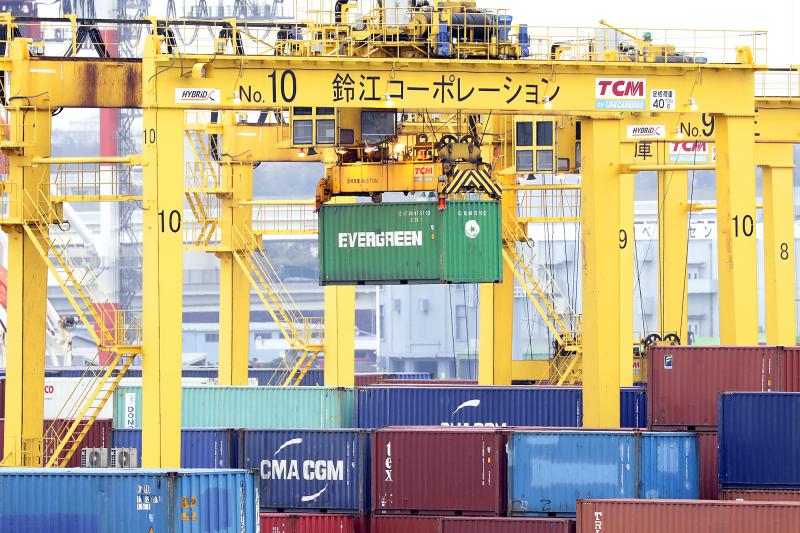Evergreen Marine Corp (長榮海運) on Tuesday said it expects a rebound in its cargo volume in the third quarter after facing an up to 20 percent plunge in the first half of the year due to the COVID-19 pandemic.
However, as uncertainties remain in the fourth quarter, the company’s annual cargo volume might fall 15 percent year-on-year for the whole of this year, the nation’s largest cargo shipper said.
While the pandemic has decelerated economic activity worldwide and weakened demand in the global container shipping market, Evergreen saw demand pick up earlier this month and has received more orders for next month and August, company chairman Anchor Chang (張正鏞) told a news briefing in Taipei.

Photo: Bloomberg
Summer is traditionally the cargo shipping industry’s peak season, as many suppliers transport their goods for clients ahead of product launches.
“The cargo volume in the third quarter is likely to be flat from last year, but it would be a decent performance considering the effects of the pandemic,” Chang said. “It is difficult to see annual growth in volume this year, as global trade declines and consumption slows due to lockdown measures.”
The world’s three major container shipping alliances — the Alliance, 2M Alliance and Ocean Alliance — have reduced their capacity amid the outbreak to address oversupply in the industry, which helps shippers maintain load factors and curb declines in freight rates, Evergreen executive vice president Patrick Wei (魏維德) said.
A reduction in capacity would have a mixed effect on shippers’ financial performance, as it would lead to a drop in revenue while saving their operational costs, such as fuel and labor costs, Wei said.
Most shippers in the past few months have performed maintenance on their idle vessels, while Evergreen has equipped its idle vessels with scrubbers to reduce emissions and meet new International Maritime Organization regulations, Wei said.
“It is questionable whether most shippers would continue trimming capacity in the fourth quarter when the cargo demand recovers, but if all shippers return to full capacity, the oversupply issue would emerge again,” he said.
For Evergreen, revenue generated from the Asia-Europe route and the Asia-US route accounts for 65 percent of its total revenue.
A second wave of COVID-19 in the West could complicate fourth-quarter visibility for cargo volume, he said.
The shipper has reported no infections among its crews, saying that it bars them from disembarking when arriving at any port and does not allow families aboard.
Evergreen also routinely takes its crews’ temperatures and orders them to self-isolate before boarding, it said.
The company added that it has extended contracts with crew members who could not return home due to border restrictions.
“This is a challenging year for shippers,” Chang said.
Evergreen reported a net loss of NT$441.3 million (US$14.89 million) for the first quarter, after revenue fell 4.86 percent year-on-year to NT$43.48 billion.
Net loss per share was NT$0.09 in the first quarter, compared with earnings per share of NT$0.12 a year earlier.

POWERING UP: PSUs for AI servers made up about 50% of Delta’s total server PSU revenue during the first three quarters of last year, the company said Power supply and electronic components maker Delta Electronics Inc (台達電) reported record-high revenue of NT$161.61 billion (US$5.11 billion) for last quarter and said it remains positive about this quarter. Last quarter’s figure was up 7.6 percent from the previous quarter and 41.51 percent higher than a year earlier, and largely in line with Yuanta Securities Investment Consulting Co’s (元大投顧) forecast of NT$160 billion. Delta’s annual revenue last year rose 31.76 percent year-on-year to NT$554.89 billion, also a record high for the company. Its strong performance reflected continued demand for high-performance power solutions and advanced liquid-cooling products used in artificial intelligence (AI) data centers,

SIZE MATTERS: TSMC started phasing out 8-inch wafer production last year, while Samsung is more aggressively retiring 8-inch capacity, TrendForce said Chipmakers are expected to raise prices of 8-inch wafers by up to 20 percent this year on concern over supply constraints as major contract chipmakers Taiwan Semiconductor Manufacturing Co (TSMC, 台積電) and Samsung Electronics Co gradually retire less advanced wafer capacity, TrendForce Corp (集邦科技) said yesterday. It is the first significant across-the-board price hike since a global semiconductor correction in 2023, the Taipei-based market researcher said in a report. Global 8-inch wafer capacity slid 0.3 percent year-on-year last year, although 8-inch wafer prices still hovered at relatively stable levels throughout the year, TrendForce said. The downward trend is expected to continue this year,

Vincent Wei led fellow Singaporean farmers around an empty Malaysian plot, laying out plans for a greenhouse and rows of leafy vegetables. What he pitched was not just space for crops, but a lifeline for growers struggling to make ends meet in a city-state with high prices and little vacant land. The future agriculture hub is part of a joint special economic zone launched last year by the two neighbors, expected to cost US$123 million and produce 10,000 tonnes of fresh produce annually. It is attracting Singaporean farmers with promises of cheaper land, labor and energy just over the border.

US actor Matthew McConaughey has filed recordings of his image and voice with US patent authorities to protect them from unauthorized usage by artificial intelligence (AI) platforms, a representative said earlier this week. Several video clips and audio recordings were registered by the commercial arm of the Just Keep Livin’ Foundation, a non-profit created by the Oscar-winning actor and his wife, Camila, according to the US Patent and Trademark Office database. Many artists are increasingly concerned about the uncontrolled use of their image via generative AI since the rollout of ChatGPT and other AI-powered tools. Several US states have adopted